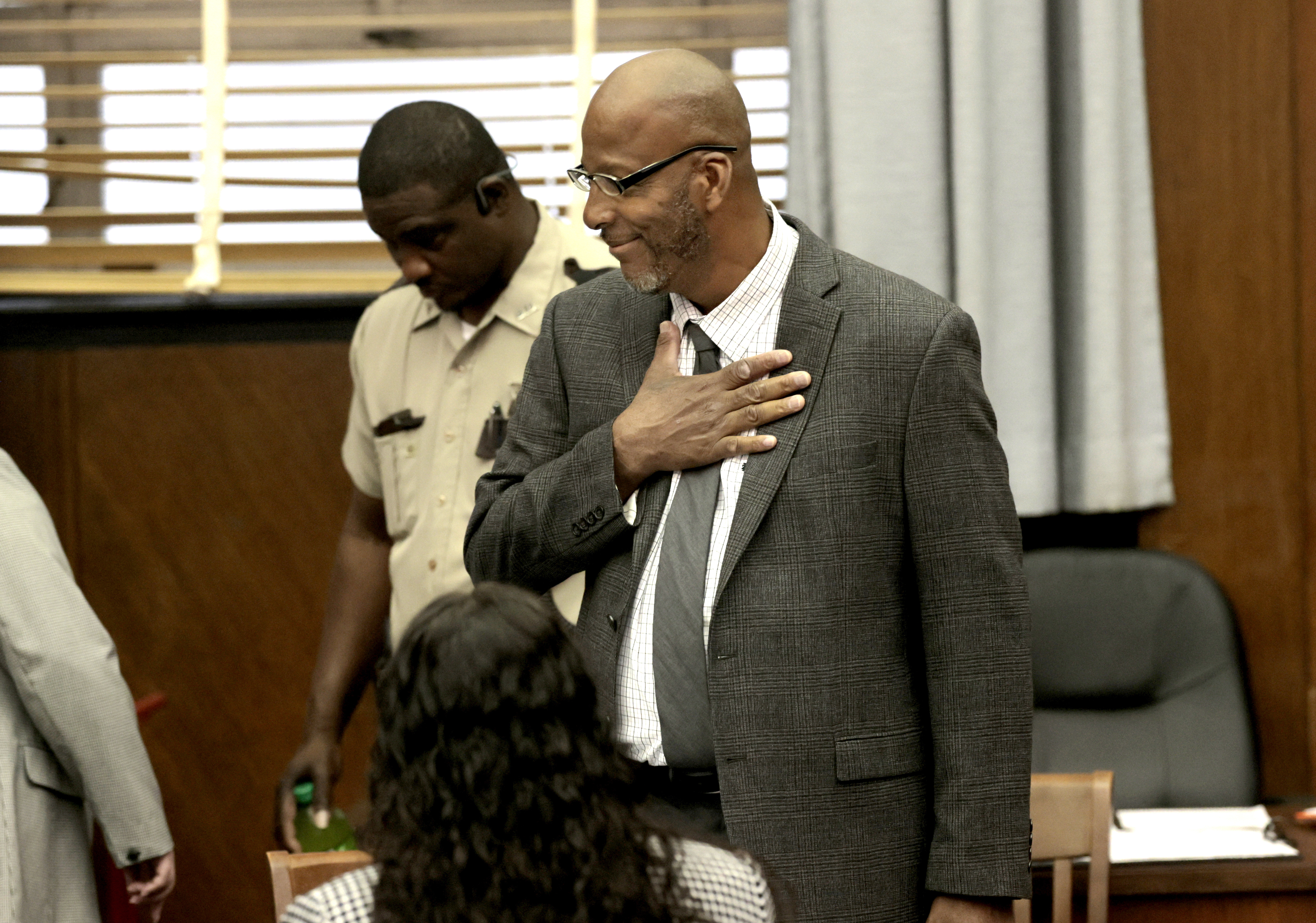An exonerated man was '50 feet from freedom.' Then a court stopped him

Christopher Dunn arrives in court, May 21, 2024, at the Carnahan Courthouse in St. Louis. (File photo by Laurie Skrivan/St. Louis Post-Dispatch via AP, Pool)
Christopher Dunn was steps away from freedom.
He was wearing civilian clothes picked out months before: a sage green button-down, a blazer, and a green and blue tie that brought it all together. He had on real underwear, the kind with an elastic band that he hadn’t worn in 34 years, and had thrown out his prison toothbrush. His wife would be waiting with a new one in the parking lot.
A judge had finally ruled two days earlier what Dunn had always maintained: He was wrongfully convicted of murder in 1990.
But as the Missouri Department of Correction was finalizing his release papers Wednesday, the warden got the call. The state Supreme Court had halted the release order after the state attorney general appealed to keep Dunn in prison.
“It was probably the highest high and lowest low I can remember in my life,” said Kira Dunn, who had used saved-up airline miles to fly in from California to see her husband’s release. “We were completely stunned.”
“He was literally 50 feet from freedom,” she added.
On Monday, St. Louis Circuit Court Judge Jason Sengheiser had ruled Dunn, 52, was wrongfully convicted of the murder of 15-year-old Ricco Rogers and ordered he be released by Wednesday evening.
The judge wrote that St. Louis Circuit Attorney Gabe Gore had proved Dunn’s “actual innocence,” after two witnesses who had identified Dunn as the killer in 1990 later recanted their testimony as adults, saying they had been coerced by police to testify.
Missouri Attorney General Andrew Bailey, a Republican, argued that the recantations had been coerced and that Dunn was really guilty. Sengheiser rejected his argument, writing in his decision that, “The Attorney General provided zero evidence to support these allegations.”
Within hours of that ruling, Bailey filed an appeal. Just before the Wednesday deadline to free Dunn, the state’s top court stopped his release to let the appeal process play out.
That court could rule on the case and set Dunn free as soon as next week.
In the meantime, he has traded in his civilian clothes for another prison jumpsuit, his wife said.
“He had gotten rid of all his property at the prison,” Kira Dunn said. “We’re so hurt and, frankly, don’t understand why the person who’s tasked with defending the well-being of Missourians would do this.”
Dunn has maintained his innocence for decades. In 2020, another judge found that a jury would likely find him not guilty based on new evidence but said he couldn’t exonerate Dunn because only those on death row in Missouri were eligible for that ruling.
The state then passed a law in 2021 expanding who could seek new hearings, allowing prosecutors to bring possible wrongful-conviction cases to court when new evidence arises.
In February of this year, Gore, the St. Louis prosecutor, did just that, filing a motion seeking to vacate the guilty verdict.
Court filings show that Bailey, the state attorney general, advised the Department of Corrections to wait to release Dunn until the appeal played out.
“Throughout the appeals process, multiple courts have affirmed Christopher Dunn’s murder conviction,” Madeline Sieren, Bailey’s spokesperson, said in an email. “We will always fight for the rule of law and to obtain justice for victims.”
Sieren declined to comment further on the record, citing the pending litigation.
Dunn’s case is the second time in weeks Bailey has sought to appeal an overturned conviction to the state’s top court.
After another judge overturned the conviction of Sandra Hemme for a 1980 fatal stabbing on June 14, Bailey’s office also told prison officials not to release the 64-year-old woman while the appeals process proceeded. Missouri’s top court agreed with the vacated ruling, and the judge in that case said last week that if Hemme wasn’t released, Bailey would have to appear in court himself. She was released that day.
Charles Zug, a political science professor at the University of Missouri, noted that Bailey gave little legal rationale for why Dunn shouldn’t be released. He said there could be a political reason.
Bailey is facing a primary challenge to his right by attorney Will Scharf, who has represented Donald Trump. The former president has not yet made an endorsement in the race, but Zug noted that if he did, it could swing the primary. Zug said he interprets what Bailey is doing as trying to bolster his “law and order” bona fides to national party officials and garner their support.
“He seems to be throwing spaghetti at the walls trying to signal as much as possible to national Republicans that he’s conservative enough,” Zug said. “Unfortunately, Dunn has found himself as a chess piece here.”
On Thursday, Dunn’s attorneys argued in a filing to the Missouri Supreme Court that Bailey had no right to appeal the judge’s ruling, and that only the prosecutor who fought for Dunn’s release could do so.
“This tug-of-war should end,” they wrote.
Dunn’s mother, sisters and nephew had joined his wife, Kira, in Missouri to see Dunn walk out of prison Wednesday. When they found out that wouldn’t be happening, Kira went inside to talk to the warden, who let her see her husband.
The light was out of Dunn’s eyes, she said. They held hands. She told him it was a bump in the road, that she would be back next week waiting outside the prison, waiting for him.
“We’ve been waiting a long, long time,” she said. “I guess we’ll just keep waiting.”



